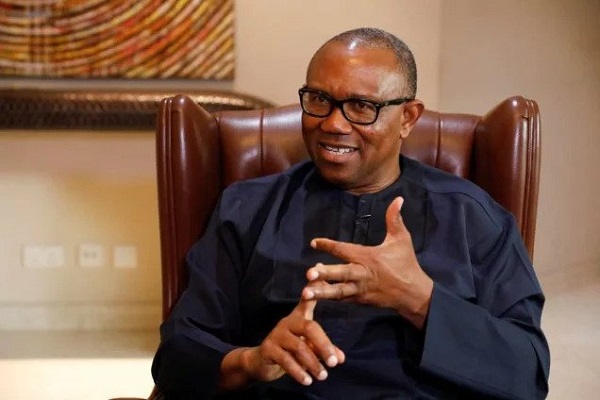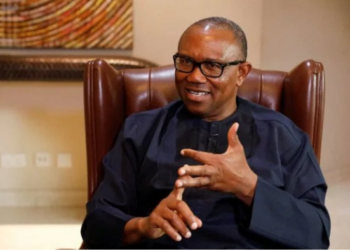Labour Party presidential candidate, Peter Obi, has promised to give the country a stable national grid by the end of 2023.
This is according to his campaign manifesto that was officially released on December 4. Peter Obi’s manifesto stated that one of the party’s goals of the power sector is to:
- “Achieve a revamped, upgraded, and stable national grid working with Siemens by the end of 2023.”
The process: In the manifesto, Peter Obi says he intends to build on the current agreement the Buhari administration has with Siemens Energy under the presidential power initiative (PPI). According to the manifesto, Obi will successfully complete the $2.3b Nigeria-Siemens network improvement deal (technical upgrade and strengthening) to achieve 7,000 megawatts (MW) stable capacity by 2023, 11,000 megawatts by 2024, and 25,000 megawatts by 2025.
According to the manifesto, Obi will focus on resolving a number of current challenges across the power value chain (generation, transmission, distribution) as well as using natural gas and renewable energy to solve Nigeria’s power problems. Some of the solutions given include:
Transmission: The administration will retain top local and international financial advisers to restructure the Transmission Company of Nigeria (TCN).
- They will also enhance the technical availability of the transmission network, and grid stability through bankable performance contracts.
- The TCN will be incentivized to take every/all step to forestall power grid collapses, while they will be compensated for grid stability and performance.
Generation: Obi will launch a solar power revolution across Nigeria, especially the northern region, with a view of ensuring that all cities and industrial parks in the region have uninterrupted power by the end of 2024. This will be done through the following steps:
- Urgently re-engaging the 14 Independent Power Producers (IPPs), who had in 2016, initiated power purchase agreements (PPAs) worth $2.5 billion to build a total of 1,125 MW of installed solar capacity for delivery to the national grid.
- Removing the main structural impediments to reaching financial closure (mainly to do with Nigerian Bulk Electricity Trading’s bankability as a counterparty).
- Negotiating a win-win Power Purchase Agreement (PPA) with an excellent list of local and international investors, who have already demonstrated their capacity to fund these projects.
- Increase the capacity of some of the 14 plants to achieve 5,000MW generation by expanding at least 10 of the projects, where transmission capacity has been expanded or proven local demand has been adequately developed.
- Invite experienced local and international developers to sign new PPAs for 8,000MW of solar and wind plants, including offshore wind farms in the Lagos, Warri, and Port-Harcourt coastal areas with a mandatory latest commercial operation date of December 2025.
- Restructuring the Niger Delta Power Holding Company, NDPHC to release its 4000MW of generating capacity.
- Returning Gbarain, Ihovbor, Olorunsogo, Alaoji, Calabar, Sapele, Omoku, Alaoji, Omotosho II, Olorunsogo II, and Geregu II to optimal status in terms of capacity and performance
Natural gas-fired power: Obi plans to fast-track the Nigerian Gas Flare Commercialization Programme (NGFCP) to secure gas being wasted through flaring. Other initiatives include:
- Increasing the gas utilization rate through a coherent gas-to-power drive, strenuous enforcement of the domestic gas supply obligations of oil and gas companies, and development of new gas-to-power infrastructure through fiscal incentives.
- Enacting policies and measures to enable embedded power generation to access pipeline gas was available at input pricing to equal the current gas-to-power price plus transportation of $2.50 + 80 cents, or some more affordable pricing, as opposed to the current $7.00 – $8.00 per million standard cubic feet (mscf).
- Within 3 years, each of the southern states should develop and construct embedded power plants of capacities ranging from 5MW to 30MW up to a total of 300MW per state from locally-sourced gas in and around the states.
- Natural gas power plants and mother stations will be built near gas lines and gas sources, to make the gas inputs to the embedded power plants as cheap as possible, so that the electricity generated and fed into the local distribution company (DisCo) networks from them will be at current DisCo tariff.
Obi also plans to complete and commission the Mambilla hydroelectric power (HEP) project, which is planned to deliver 3,050MW; the Kashimbila Dam project planned to deliver 40MW; and the 40MW Dadinkowa HEP plant.
Distribution: Obi will work with the Nigerian Electricity Regulatory Commission (NERC) to provide stable, reliable, and adequate power to customers.
- Enforce the removal of investors who do not demonstrate the adequate capacity to improve their network, reduce technical and commercial losses, improve quality of service and customer satisfaction; and demonstrate the adequate capacity to continue to operate their franchises satisfactorily, including investments in technology, human capacity, and customer offerings.
- Complete the National Mass Metering Program (NMMP) and require DisCos to replace all damaged and obsolete meters under the NMMP in strict compliance with the Metering Code and other extant regulations by the end of 2023.
- Support DisCos with distribution and transmission bottlenecks by the end of 2023, to cut technical and commercial losses to single digits across the Nigeria Electricity Supply Industry (NESI).
Off-grid power: Obi plans to work with the Rural Electrification Agency (REA), through collaborations with the private sector and international development finance institutions (DFIs) to develop 100,000 mini-grids across the country by the end of 2024, providing reliable power supply for up to 750,000 rural small and medium enterprises (SMEs).
- The collaboration will provide an uninterrupted power supply in all federal universities and university teaching hospitals; support the private sector to deploy 15 million solar standalone systems for residential and SMEs use by the end of 2025.
Nuclear power: According to the manifesto, Nigeria, with technical support and backing from China, has been working on its nuclear energy project at Ahmadu Bello University in Kaduna since the mid-1990s. The location opened in 2004, and is home to roughly 170 Nigerian workers, and operating its second reactor.
- Obi will support the current efforts by the Nigerian Nuclear Regulatory Agency (NNRA) to procure build, own, operate, and transfer (BOOT) contracts for top international nuclear companies to construct nuclear power plants to generate 4,000 MW of electricity at acceptable PPA terms for over 40 years.
Financing the process: According to the manifesto, the financing plan for the power sector reform involves the following:
- Project and export finance
- Trade finance advisory and insurance
- Development and multilateral institutions’ long-term debt facilities and export credit insurance.
- Also, the private sector participants will be expected and incentivized to provide equity, expertise, governance, warranties, bonds, and other suitable financial and performance guarantees as a condition for participating in the sector.
For the record: In summary, Peter Obi’s manifesto states that the administration’s power sector reform will bring about the following goals:
- Deliver 5,000 direct jobs and 100,000 indirect jobs in the Nigeria Electricity Supply Industry (NESI).
- Reform and restructure the Nigeria Electricity Supply Industry (NESI) to deliver adequate, accessible, reliable, and affordable power for Nigerians
- Release financing of new power generation to 25 GW by 2030, including an additional 5,000 MW of new power generation by the end of 2024
- Achieve a revamped, upgraded, and stable national grid working with Siemens by the end of 2023
- Ensure financially stable, capable and customer service delivery-oriented DisCos
- Support local manufacturing capacity of power technologies
- Encourage and expand local Research and Development (R&D) in universities, training centers, and workshops

















